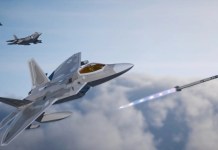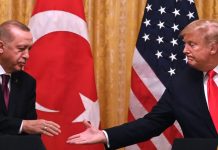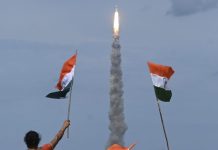A US guided-missile destroyer (USS Laboon) has reportedly entered the Black Sea ahead of the much-anticipated summit between Russian President Vladimir Putin and his US counterpart Joe Biden, scheduled for June 16 in Geneva.
- Watch: The Ultimate Dogfight Between US & Russian Fighter Jets Over A ‘Top-Secret’ Air Base In Nevada
- 30 Times Faster Than Speed Of Sound: Is China Really Winning The Hypersonic Race With Its JF-22 Wind Tunnel?
According to a statement by U.S. 6th fleet, “USS Laboon (DDG-58) entered the Black Sea on Friday in concert with a U.S. Navy P-8A Poseidon and a NATO E-3A Sentry Airborne Warning and Control System (AWACS)”.
The development, which could fuel fresh tensions in the Baltic region, comes just a few days before Biden’s first meeting with Putin since he assumed office in January. The in-person interaction is mooted as an important step in resetting bilateral ties between the two erstwhile Cold War rivals.
The US-Russia Tussle
The USS Laboon (DDG-58), an Arleigh Burke-class destroyer, is part of the Eisenhower Carrier Strike Group and is the fifth U.S. Navy ship to enter the contested waters in this year alone.
According to the Russian News Agency TASS, the Russian Navy’s Black Sea forces are tracking USS Laboon.

“The Black Sea Fleet’s forces and capabilities have started to track the US Navy guided-missile destroyer Laboon that entered the Black Sea on June 11, 2021,” Russia’s National Defense Control Center said in a statement.
In April, Russia flexed its muscles on its border with Ukraine and Crimea, the area it allegedly annexed in 2014. Satellite images and social media showed a huge military built-up by Russian forces along with tanks and troops.
BREAKING: #USSLaboon (DDG58) began its northbound transit into the #BlackSea to conduct #maritimesecurity operations in the region. The @USNavy routinely operates with our @NATO Allies & partners in the Black Sea!#PowerForPeace pic.twitter.com/4bnFTyuOgQ
— U.S. Naval Forces Europe-Africa/U.S. Sixth Fleet (@USNavyEurope) June 11, 2021
Calling it “snap checks” along the contested borders, the Russian Defence Minister defended the military drills against the perceived threat from NATO. “The troops have demonstrated their ability to provide a credible defense for the country,” he added.
An international outcry prompted Russia to scale down its activity and withdraw troops from Ukrainian borders. However, Ukraine alleges that Russia continues to keep nearly 100,000 soldiers, along with hundreds of tanks, armored vehicles, artillery systems, and rockets along the border.
“Russia has withdrawn only a tiny fraction of its forces deployed at Ukraine’s border and in the temporarily occupied parts of its territory. Along the border and in Crimea, the Russian Federation keeps up to 100,000 servicemen; up to 1,300 tanks; up to 3,700 armored vehicles; up to 1,300 artillery systems; and up to 380 rocket systems,” senior Ukrainian diplomat Yevhenii Tsymbaliuk had said in Vienna.
The Geopolitics Of Black Sea
The Black Sea is a strategic waterway at the crossroads of Europe, Russia, and the Middle East. The resource-rich region houses clusters of hydrocarbons, oil and gas pipelines along with significant fiber optic cables.
It is increasingly becoming a geopolitical theater for confrontation between Russia and the NATO forces, led by western allies. What makes NATO an important player in the region is the fact that three of the six bordering countries are part of this military alliance (Turkey, Romania, and Bulgaria) and two of them are aspiring members (Hungary and Ukraine).
On the other hand, Russia’s interests in the Black Sea are driven by political, security, and economic concerns. The only warm water ports that the largest country in the world has access to, most of the Russian oil passes through the sea to reach European markets. In April, Russia announced its plans to block a part of the territorial body which was immediately condemned by the US and its allies.
“From 21:00 on April 24 until 21:00 on Oct. 31, passage through the territorial sea of the Russian Federation for foreign military ships and other state vessels will be halted,” the state-run RIA Novosti news agency had reported, citing a statement by the Defense Ministry.
Analysts and security experts feared that Russia is planning a Crimea-style invasion into Ukraine which is already battling a pro-Russian separatist movement in the eastern region, adjoining Russia.
“Russia views the Crimean peninsula as a springboard to project power into the wider Mediterranean region,” writes Paul Stronski, a senior fellow at Carnegie’s Russia and Eurasia program.
“It eyes opportunities to expand its influence in Mediterranean countries like Cyprus, Egypt, Israel, Libya, and Turkey,” he added.
On the security front, Russia sees NATO’s presence and influence as a direct threat to its historical control and influence in the erstwhile-Soviet empire. It is wary of the NATO missile defense system deployed in Romania and has repeatedly tried to break the momentum of NATO’s expansion in Eastern Europe and the Caucasus, particularly Ukraine and Georgia which are already NATO’s Enhanced Opportunities Partners.
In Biden’s phone call to Putin that came during the Ukraine development, the Geneva summit was proposed that both leaders have agreed to.
In a media interview with NBC, Putin noted that the US-Russia relations are at their “lowest point” in years.
“A summit between the two countries is needed to prevent further degradation of our dialogue,” Kremlin spokesperson Dmitry Peskov recently told CNN in an interview.
Ahead of the historic talks, the words and actions of the two great powers display the complexities in their relationship and point towards difficulty in untangling the geopolitical mess.
Read More
- WATCH: Russian Su-30 Fighter Forces F-35 Stealth Jets To Retreat In Their ‘First-Ever Encounter’
- Despite World’s Biggest Navy, Why China Will Struggle To Match Indian Submarines In The Indo-Pacific?




